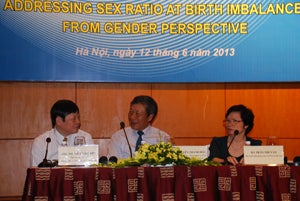Ha Noi, 12 June 2013 - The imbalance of Sex Ratios at Birth (SRB) is an increasing concern in some Asian countries, where about 117 million women and girls are reported as “missing”. In Viet Nam, the SRB rose from 106.2 boys per 100 girls in 2000 to 112.3 boys per 100 girls in 2012 and this sharp trend continues to rise. SRB imbalance is largely caused by favouring sons and placing lower values on girls. Therefore, strengthening gender equality and enhancing women and girls' empowerment are key to addressing effectively this issue. This issue was discussed during the workshop on "Addressing the Imbalance of Sex Ratio at Birth from Gender Perspectives" co-organized today in Ha Noi by the Ministry of Labour, Invalids and Social Affairs (MOLISA) and the United Nations Population Fund (UNFPA) in Viet Nam.

Participants of the workshop were representatives from MOLISA, Ministry of Health, other line-ministries, national experts, research institutes, and Government agencies at the national and sub-national levels as well as the United Nations organizations, Embassies and the international and local NGOs in Viet Nam.
Addressing the workshop, Vice Minister of Labour, Invalid and Social Affairs/ Vice President of the National Committee for Advancement of Women Mr. Nguyen Thanh Hoa stressed that: "One of the major factors contributing to the rise of the SRB imbalance in Viet Nam is strong son preference, which has deep cultural roots and gender discrimination against women and girls". Therefore, more efforts are needed to strengthen comprehensive communication activities on the important roles of women and girls in society.
The workshop was a great opportunity for policy makers, national experts and programmers on gender equality to discuss, learn experiences from other countries and develop effective interventions from gender perspectives. The outcomes from the workshop will help Viet Nam implement effectively the National Strategy on Gender Equality and the National Strategy on Population and Reproductive Health, period 2011-2020.
The imbalanced SRB will affect Viet Nam’s population structure in the future, resulting in an excess of males in society. The consequences are potentially serious: a scarcity of women would increase pressure for them to marry at a younger age and perhaps drop out of school to do so. There may be a rising demand for sex work; and trafficking networks may also expand in response to this imbalance. Examples of gender-based violence and human trafficking have already been observed in Viet Nam and point to some of the risks faced by vulnerable girls and women.
During the workshop, national experts presented the relationship between gender inequality and sex ratio at birth imbalance. The experts also highlighted the importance of behavour change communication to address gender discrimination. "More emphasis is needed on promoting the role of women and girls in society, improving their status and realising their rights. Young men and boys must be encouraged to step forward as agents of necessary social cultural change. Leaders and party members play a key role in setting an example in promoting gender equality," said Mrs. Tran Thi Van, UNFPA Officer-in-Charge in Viet Nam.
Viet Nam has undertaken a number of measures to halt increasing sex ratio imbalances. However, renewed and concerted efforts are now needed including efforts to address the deeply rooted gender discrimination against women and girls which lies at the heart of sex selection.
The workshop has been succeeded with the commitments and recommendations on gender equality of the all parties to support the effective implementation of the National Strategy for Gender Equality (2011-2020) and the National Programme on Gender Equality (2011-2015) and ensure a society for all.
For further information, please contact:
Ms. Nguyen Thi Hong Thanh
United Nations Communications Team
Tel: (84-4) 3822 4383 – ext: 117
Email: tnguyen@unfpa.org

